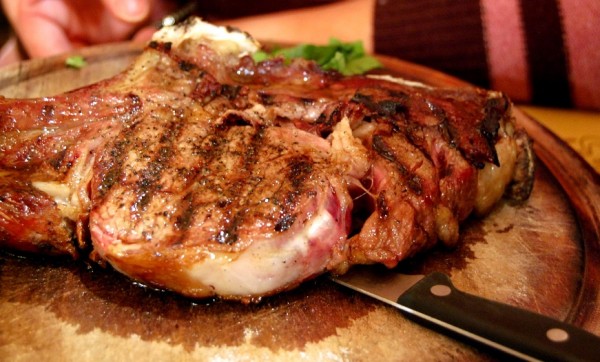By Ana Verayo, | March 10, 2016

The development of speech in early humans was most likely triggered by chewing meat.
Meat is an important part of almost everyone's diet and is considered to be an excellent source of energy, however new research reveals how human consumption and preparation of animal products apparently played a crucial role in the evolution of humans.
Like Us on Facebook
Researchers from Harvard University suggest that mastication or chewing of meat had a significant effect in the evolution of speech and communication. They believe that this mouth action of gnawing on flesh could has been favorable for evolution, as it encouraged the development of teeth and small jaws.
Humans are unique as they also cut first the meat into smaller pieces before chewing that more or less saved time and energy for early hominids as opposed to primates. These changes are considered to be very important in the development of complex speech which can shed more light about human evolution.
The Homo erectus species which is one of our human ancestors, first evolved some 1.8 million years ago and possessed a larger brain and body than its homo genus predecessors. This means that these prehistoric humans need a greater amount of energy that earlier human species, which means more intake of calories.
However, the Homo erectus was not efficient in consuming energy from food unlike higher primates. These prehistoric humans now have smaller guts and their jaw muscles are now weaker compared to other species, which includes smaller teeth as well.
Paleontologists believe that when early humans learned how to cook, this could explain the weaker teeth and jaw structures and features. However, scientists say that the earliest evidence of cooking was only 1 million years ago which has not yet evolved into regular practice up until 400,000 to 500,000 years ago. The emergence of cooking and the existence of the Homo erectus reveled a huge discrepancy among each other.
In this new study, participants in an experiment gnawed on raw goat flesh, which is a tough meat that was similar to wild game consumed by ancient humans. The flesh was just prepared in the most minimal manner, not cooked all the way through, which is also similar to how prehistoric humans used cooking techniques. The experiment included using crude instruments such as volcanic glass known as obsidian to slice the meat.
According to Katherine Zink from Harvard University, these stone flakes that are stricken off from rocks are sharper than any existing average kitchen knife. Apparently, chimpanzees spend almost half of their waking hours to chew their food, that can exhaust themselves of time and energy. In the animal kingdom, humans are considered to be the most efficient chewers which are revealed from the results of this new study, that is also consistent with favored human traits.
This new study is published in the journal Nature.
-
Use of Coronavirus Pandemic Drones Raises Privacy Concerns: Drones Spread Fear, Local Officials Say

-
Coronavirus Hampers The Delivery Of Lockheed Martin F-35 Stealth Fighters For 2020

-
Instagram Speeds Up Plans to Add Account Memorialization Feature Due to COVID-19 Deaths

-
NASA: Perseverance Plans to Bring 'Mars Rock' to Earth in 2031

-
600 Dead And 3,000 In The Hospital as Iranians Believed Drinking High-Concentrations of Alcohol Can Cure The Coronavirus

-
600 Dead And 3,000 In The Hospital as Iranians Believed Drinking High-Concentrations of Alcohol Can Cure The Coronavirus

-
COVID-19: Doctors, Nurses Use Virtual Reality to Learn New Skills in Treating Coronavirus Patients







